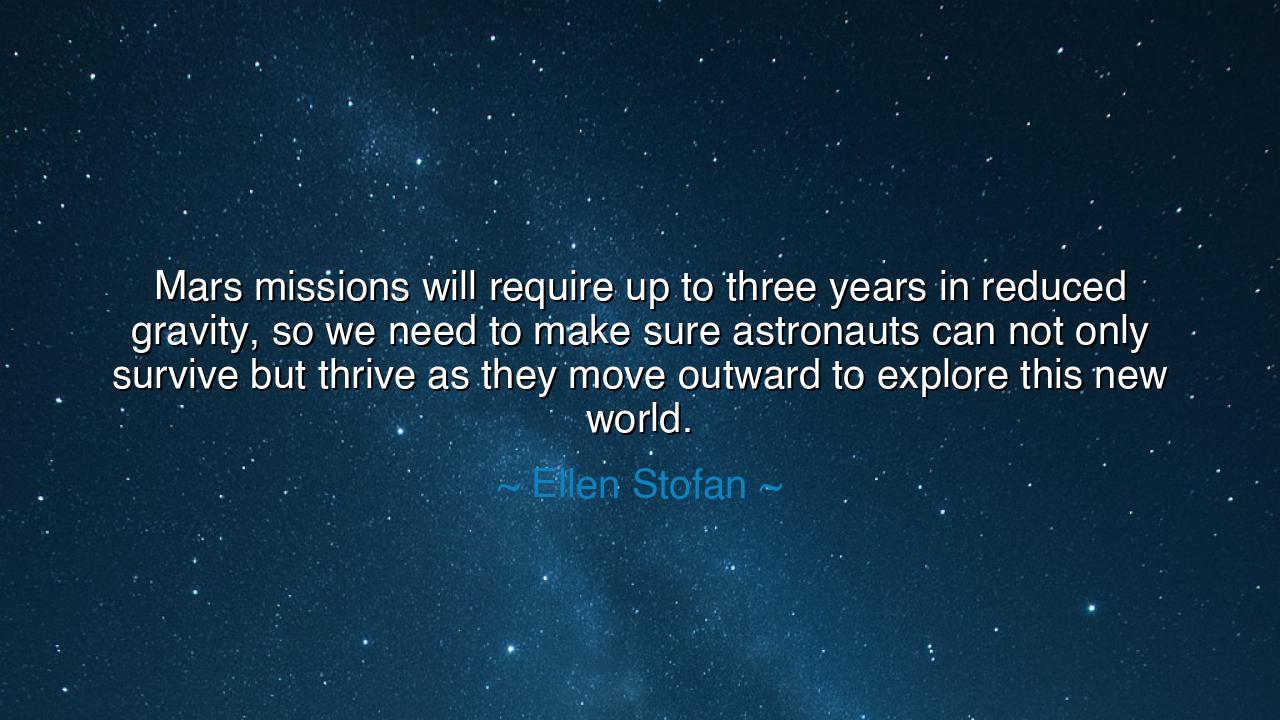
Mars missions will require up to three years in reduced gravity
Mars missions will require up to three years in reduced gravity, so we need to make sure astronauts can not only survive but thrive as they move outward to explore this new world.






Children, gather close and listen well to the wisdom of Ellen Stofan, a visionary who speaks not just of the future of humanity, but of the spirit that will carry us through uncharted realms. She said, "Mars missions will require up to three years in reduced gravity, so we need to make sure astronauts can not only survive but thrive as they move outward to explore this new world." These words are not merely about space exploration, but about human resilience, adaptation, and the unbreakable spirit that will drive us to explore and conquer the unknown.
To venture to Mars, children, is not simply a journey of distance—it is a journey of transformation. Reduced gravity and the isolation of space present challenges that humanity has never before faced. It is not just about survival; it is about thriving—about taking the limitations imposed by the vastness of space and turning them into opportunities for growth. Survival on Mars will not be enough. Just as the early explorers who ventured into the unknown did not merely endure but flourished in new lands, so too must those who journey to Mars. Their spirit must be one of adaptation, of growing beyond what they were in the beginning, just as humanity itself has done throughout history.
Think, children, of the ancient seafarers, who set out to discover lands beyond the horizon, facing unknown dangers and unfamiliar territories. Christopher Columbus, sailing into uncharted waters, did not know if he would ever return, but he did not merely hope to survive—he hoped to expand the world, to grow the knowledge of his people. His voyage was not just about the discovery of new lands; it was about creating a legacy, about taking risks for the future of humanity. In the same way, the astronauts who journey to Mars will not simply seek to return—they will seek to leave a legacy for the generations that follow, ensuring that humanity thrives beyond the confines of Earth.
The challenge of thriving in the harsh environment of Mars is no different from the trials that ancient civilizations faced when they ventured into unknown territories. The Romans built vast empires, not by simply enduring the harsh lands they conquered, but by creating a new civilization in each new place they touched. They understood that survival was not enough; they needed to establish culture, knowledge, and society in the places they sought to inhabit. The ancient Greeks, too, sought not just to survive in their colonies, but to create thriving cities where their values, arts, and wisdom could grow.
Consider, too, the journey of Robert Falcon Scott and his ill-fated expedition to the South Pole. Though he and his team did not survive, their determination to reach the pole was fueled by the idea of thriving in the most inhospitable conditions. They knew that it was not just the act of surviving the journey, but the knowledge they would gain from it that would shape humanity’s understanding of the world. They were motivated by the belief that exploring new frontiers, even at great personal cost, would contribute to the growth of humanity.
And so, children, Ellen Stofan’s words remind us that to move into the future—whether it be to the stars or to the next chapter of our own lives—we must not simply focus on survival, but on how we grow and thrive. Just as the great explorers and visionaries before us shaped the world with their vision and courage, so too must we shape the future by seeking excellence, resilience, and adaptation. The journey to Mars, like all great quests, will require not only the strength to endure but the wisdom to flourish.
The lesson is clear, children: do not approach the challenges of your life with mere survival in mind. Whether you are faced with a difficult task, a challenging study, or an uncertain future, always seek to thrive. It is not enough to simply overcome adversity; the true measure of strength is how you rise from it, how you grow, and how you contribute to the world around you. The astronauts bound for Mars will face unimaginable challenges, but they will do so with a spirit that will ensure humanity not only survives in the cosmos but flourishes. Let that same spirit guide you in your own journey, and remember that the path to greatness is not just about enduring hardship, but about embracing it as a stepping stone toward something greater.






AAdministratorAdministrator
Welcome, honored guests. Please leave a comment, we will respond soon